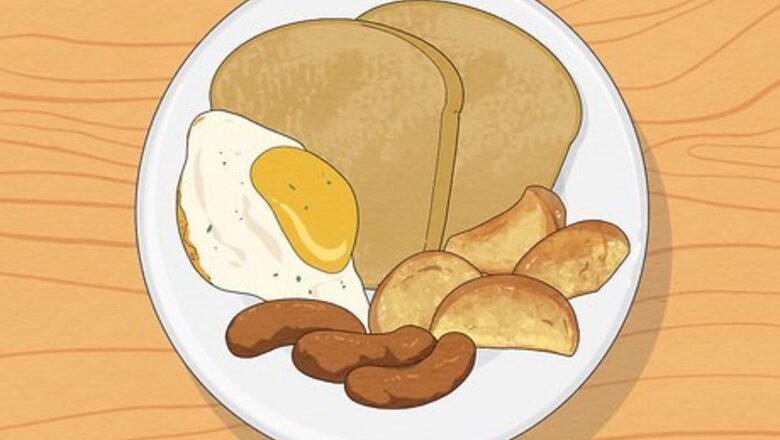
views
Changing Your Diet
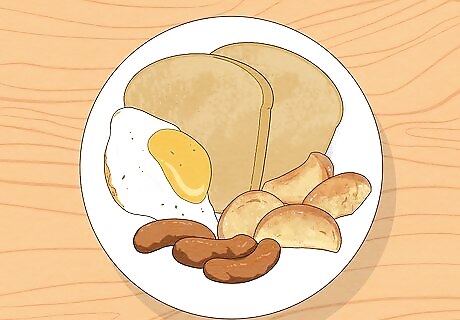
Create a calorie deficit. In order to lose weight, you'll have to create a calorie deficit. Calories are our body's fuel, and when you eat fewer of them then your body is forced to start burning fat. You can do this by matching your activity level to your diet, your diet to your activity level, or doing a little bit of both (this is the healthiest option of all). This calorie deficit is only temporary. Once you reach your target weight, you should balance your calorie intake with your activity level. Remember that carbohydrates are not bad for you.
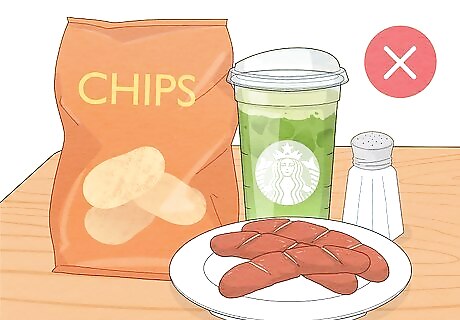
Reduce salts, fats, and sugar. A great place to start is by minimizing how much salt, unhealthy fat, and sugar you eat in your diet. Salt causes your body to retain water and bloat, sugar contains inefficient calories that make you more hungry, and fat...well...that doesn't need explaining. Salt is found in canned soup broth, many meats (hot dogs, salami, and bacon, mostly), pizza, chips, and many other foods. Your sodium intake should be less than 2300 mg per day. Don't cut it out entirely, however: salt is necessary for your body to run properly, especially once you start exercising. Sugar is found readily in candy, of course, but you can also find it in many commercial coffees (like Starbucks), soda, and juice. Even eating too much fruit can tip you over on sugar! Unhealthy fats are things like trans and saturated fats, found in red meat, butter, mayo, and fried foods. Healthy fats, such as unsaturated and polyunsaturated fats, are good for you and found in foods like fish and nuts.
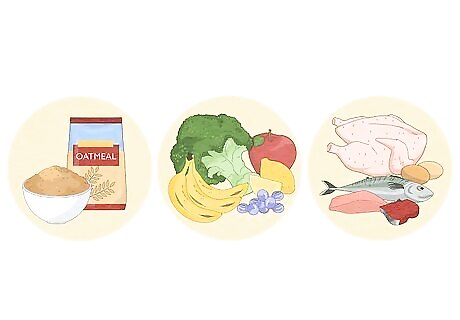
Eat nutrient-rich foods. Eating foods that are rich in nutrients will help make you feel naturally more full from eating less food. Just switching to fruits and veggies won't be enough: there is a world of difference between a celery stalk and broccoli. Nutrient rich grains include oatmeal, quinoa, barley, and brown rice. If you're buying bread, make sure to get whole grain and not multi-grain. Whole grain is the healthier option of the two, with no nutritional benefit over white bread for multi-grain. Nutrient rich vegetables and fruit include lemons, cranberries, bananas, kale, spinach, broccoli, asparagus, and brussels sprouts. The best protein sources are chicken, fish, eggs, nuts and beans. These are low in unhealthy fats, while still containing the protein that you'll need to power through your day and exercise routine. Good dairy products include non-fat plain yogurt (spice it up with fresh fruit), cottage cheese, and non-fat milk.
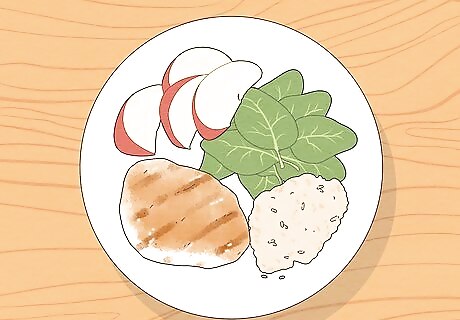
Eat a balanced diet. You'll need to not only eat healthy foods; you also have to eat them in the right proportions. Your body needs lots of carbohydrates from grains, and lots of vitamins and fiber from vegetables, a certain amount of protein, and much less sugary fruit and dairy. See the official recommendations for how to balance your diet, and avoid fad diets which recommend only eating one or limited food groups. Your body needs all of these food groups in order to stay healthy!
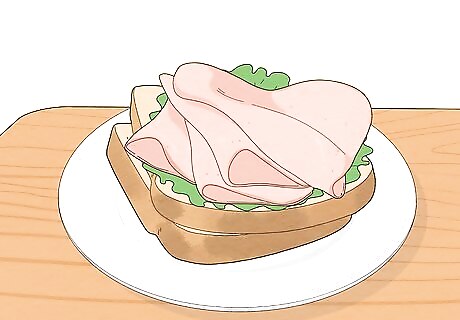
Eat smaller portions. Most people eat way too much food at once. Eating too much food stretches your stomach and makes you feel hungry, even when your body doesn't need any more food! Use a side plate instead of a dinner plate in order to help you properly portion your food. If you're still hungry 15 minutes after you finish your first plate, then you can have another half-portion of food. It's important to learn how to communicate with your body. Really analyze how you feel. Are you really still hungry? There's a big difference between feeling full and feeling stuffed, but we can be trained to forget what one feels like over the other through overeating. Avoid restaurants and if you do eat out, ask for a doggie bag. Almost all restaurants serve way too much food in one sitting. Another option is to order just an appetizer. This is usually closer to a healthy portion of food.
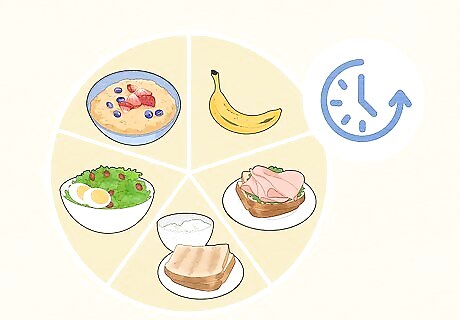
Eat more often. Eating more often can help you feel less hungry. It's also better for your metabolism, since this is how humans are designed to eat (the gatherer portion of hunter-gatherer). Eat smaller meals more frequently throughout the day in order to help you stick to that lower daily calorie count. For example, eat a small bowl of oatmeal in the morning, a banana around 10am, a turkey sandwich for lunch, a bowl of cottage cheese and a slice of toast for a mid-afternoon snack, and a salad for dinner.
Exercising with Ease
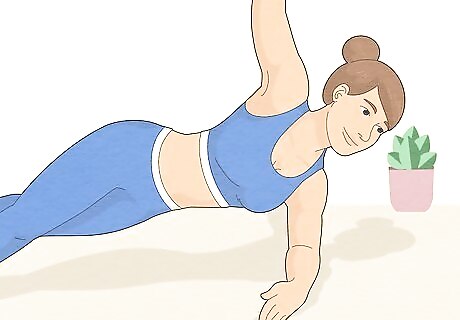
Exercise your whole body. It's important to understand that while some diets, trainers, and exercises may promise to take fat off of just one area: they're lying or very confused. It is impossible to target fat removal on your body through exercise. The only thing you can do is to lose fat overall. The same is true whether you're trying to reduce your tummy or make your bust smaller. You'll have to exercise your whole body if you want to achieve your goal. This is why if you're already pretty thin, exercise and diet can't reduce your bust size. Your body has already burned as much of that fat as it can.
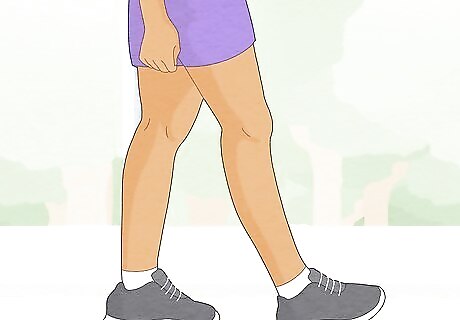
Walk more. You don't have to spend 10 hours a week at the gym just to slim down. You can increase your body's use of calories just by getting generally more active and a great, easy way to do this is by walking. Walking for at least 15 minutes at a time for at least 30 total minutes a day can play a significant role in weight loss. A good way to get some walking in is to stop taking elevators and escalators and instead using the stairs. Another basic option is to walk further to get to the places you need to go. Choose the furthest parking spot at the mall or at your office or school and take the chance to fit in some walking. Walking for an hour a day is good, but running for three hours a day or doing cardio for three hours a day will actually be detrimental to your health and lower your hormone levels to a bad place. So a reasonable amount ranging from 30 to 60 minutes of walking a day is a great place to go long term.
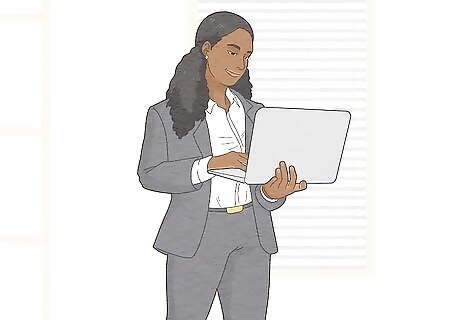
Burn calories during normal daily activities. You can easily burn a couple extra calories by exercising while you do your normal activities. Get a standing or treadmill desk for work and sit on an exercise ball instead of a chair. You can also fit some exercises seamlessly into your daily activities, like doing a couple of squats while you wait for the microwave or before you get into bed. Every little bit helps!
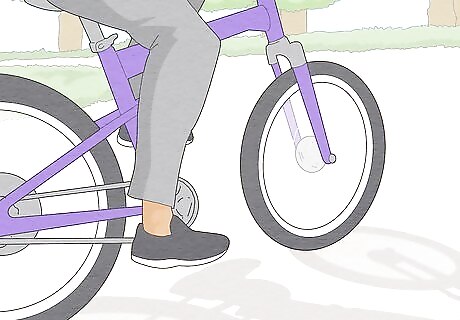
Exercise as part of transportation. Exercising as a way of getting around is another good way to fit exercise into your day. You can bike to work or school, walk to the grocery store, or walk or jog to work, if you've got space to get cleaned up afterwards. If you've got a lot of distance to cover, try taking a bus part of the way and then biking or jogging the rest.
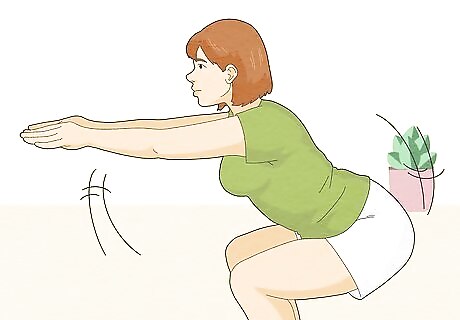
Use efficient exercises. A lot of people lose steam on exercise because they do things like sit ups, which are difficult to do and don't work very efficiently, meaning it takes a long time to see results. Efficient exercises will take a smaller chunk out of your day, making them easier to do consistently, while still achieving impressive results. Efficient exercises include squats, planks, and burpees, all of which you'll find described in this article.
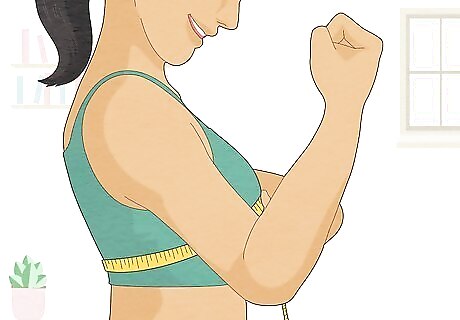
Keep motivated. Staying motivated is crucial to making exercise work because you have to be consistent and you have to make it a long term part of your life. 30 day diets and exercise plans will work for a short time but the fat (and big bust) will just come right back. Stay motivated by doing exercises that you enjoy in a way that can at least reasonably fit into your lifestyle. For an added boost, listen to music while you exercise or exercise with a partner. This can do wonders for helping you get "into the mood" and sticking to your plan.
Talking to Your Doctor
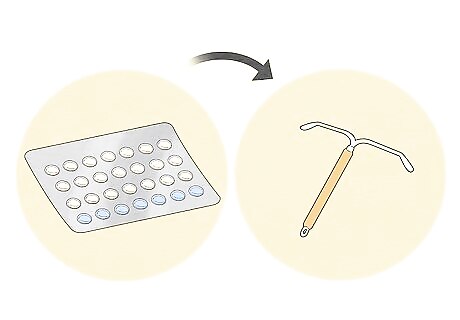
Check your medications. Some medications, especially hormonal medications like birth control, can make you gain multiple cup sizes! If you're on medications like these, talk to your doctor about alternative options. A good non-hormonal birth control option is the copper IUD, which is good for 7-10 years. Remember that other hormonal factors can also increase bust size, like pregnancy and breast feeding. These are temporary and should not be combated.
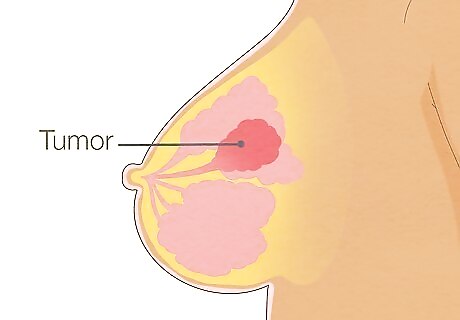
Check for breast cancer. If your are older than 35, and even if you are younger, breast cancer may play a role in large breasts that are disproportionate. If one breast is significantly larger than the other and uneven or you can feel a lump, please get this checked out by a doctor.
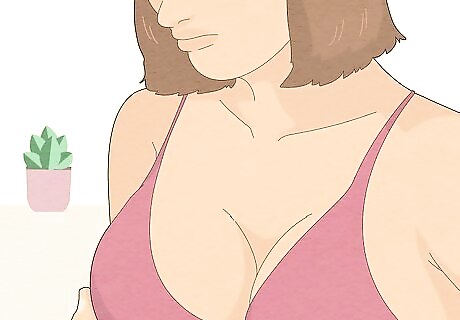
Ask for treatment options. Talk to your doctor about medical ways that may reduce your breast size. There may be medications or natural remedies that can help, but these will usually be give only after other methods have been tried first.
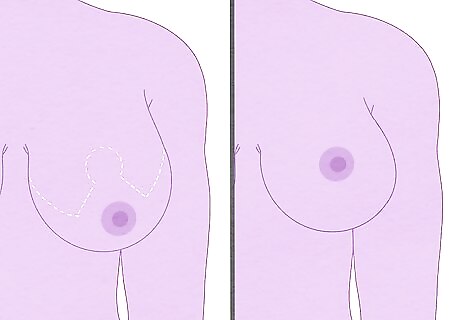
Consider reduction surgery. Don't worry about surgery if you're young. You struggle now but with time you will come to love your body and your breasts. Surgery should only be considered if your breasts cause you significant pain and back or neck problems. It is, however, an option and may even be covered by health insurance (depending on the situation).
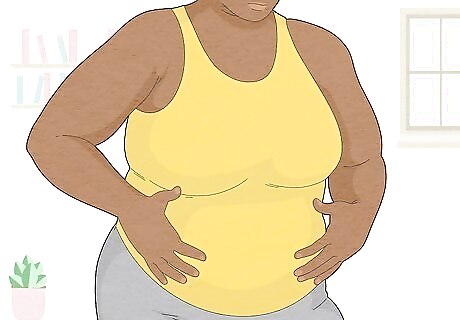
Realize when exercise is needed. If you do not have outstanding medical causes for large breasts, the most likely solution will be to lose weight. If you are already thin, this should not be considered. If, however, you are overweight, then losing weight will not only significantly reduce your bust size but it will also improve your health and experience of life in general. You'll find advice on how to lose weight in a healthy way in the later sections. You always have to start slowly and work with your current health and medical situation. Starting slowly is as easy as getting up and going for a walk.
Reducing the Appearance
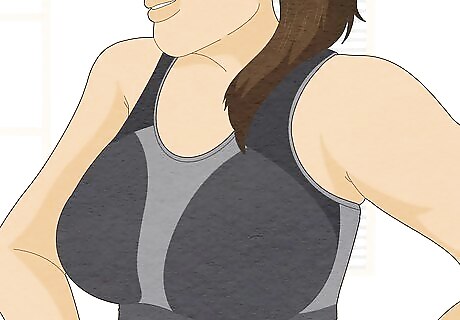
Wear a firm sports bra. A high quality, maximum support sports bra is probably the most basic way to hold in your bust and reduce it most comfortably. Buy these from reputable brands for the most effect. Low quality sports bras will wear out quickly and stop having an effect.
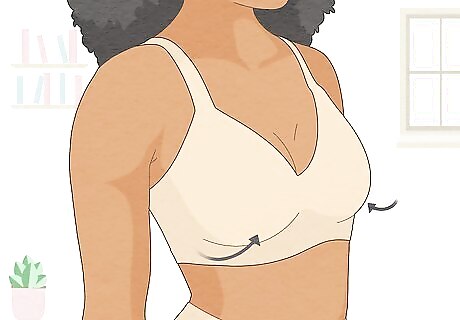
Wear a minimizing bra. You can also buy normal bras that can "reduce" the bust in that they do not do anything to make it look bigger. These are called minimizing bras. Again, high quality from a good brand is your friend here. These mainly only work with busts in the C-DD range, however.
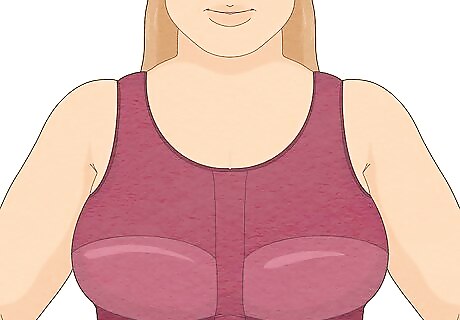
Make sure you're wearing a supportive bra that fits. Simply wearing a minimally lined bra in the correct size can have roughly the same effect as a much more expensive minimizing bra. This will also be more comfortable than any other option and is just generally good advice. It is estimated that 80% of women wear the incorrect bra size, for example.
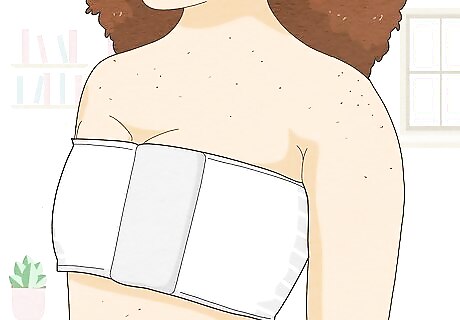
Try chest binding. If you're really desperate and other options aren't working, you can try chest binding. Never use Ace Bandages to bind, as they are meant to compress sprains and bones and will disfigure your ribs and lungs. Instead, consider buying a chest binder made for transgender individuals, which are safe. No matter what you use, do not bind for more than 6-8 hours. This trick will not work for women with extremely large breasts. It works best for those who wear a US B-DD cup. Anything larger and it is unlikely to make much of a dent.
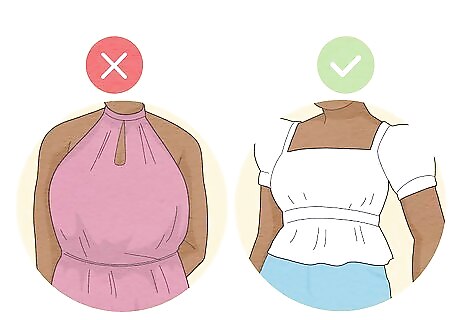
Avoid problematic clothing. Of course, you should never let something cosmetic affect what clothing you wear in terms of style. You have the right to dress like you. But some small adjustments can make a huge difference in how your chest looks. Avoid clothing that is too tight, although you do want to choose clothes that fit (aren't baggy). You should also avoid wearing a cut that accentuates your chest, such as natural waist items, cowl neck tops, or tops with puckers and gathers at the bust. Instead of these items, accentuate your hips. This will make your breasts appear smaller by comparison.



















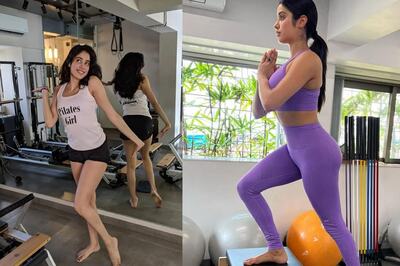
Comments
0 comment